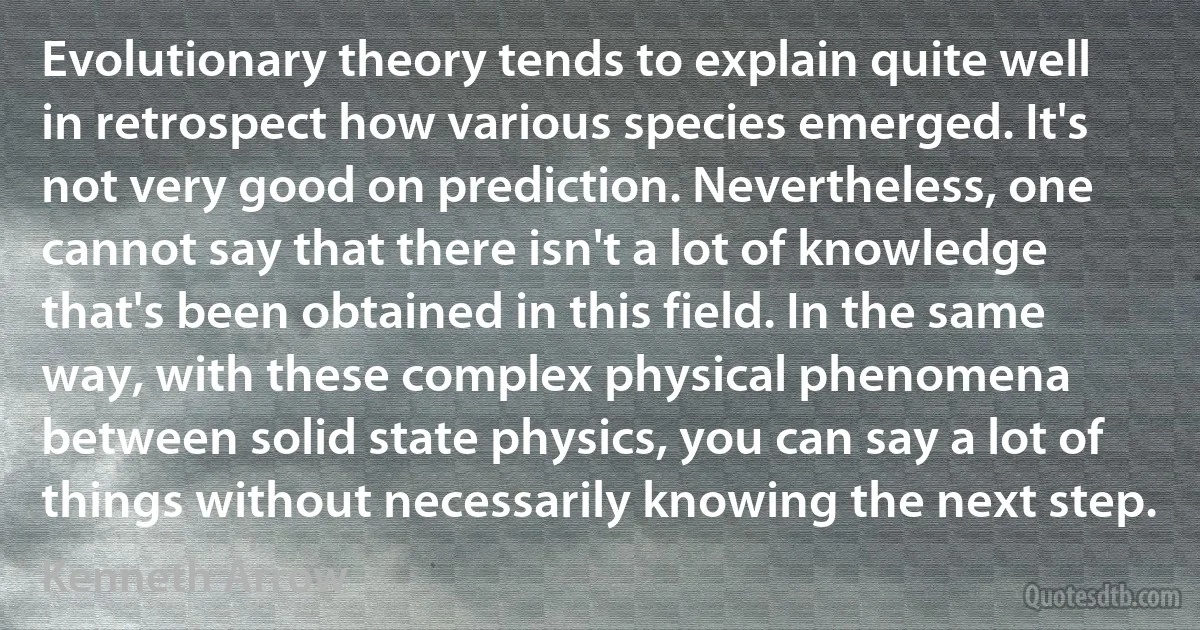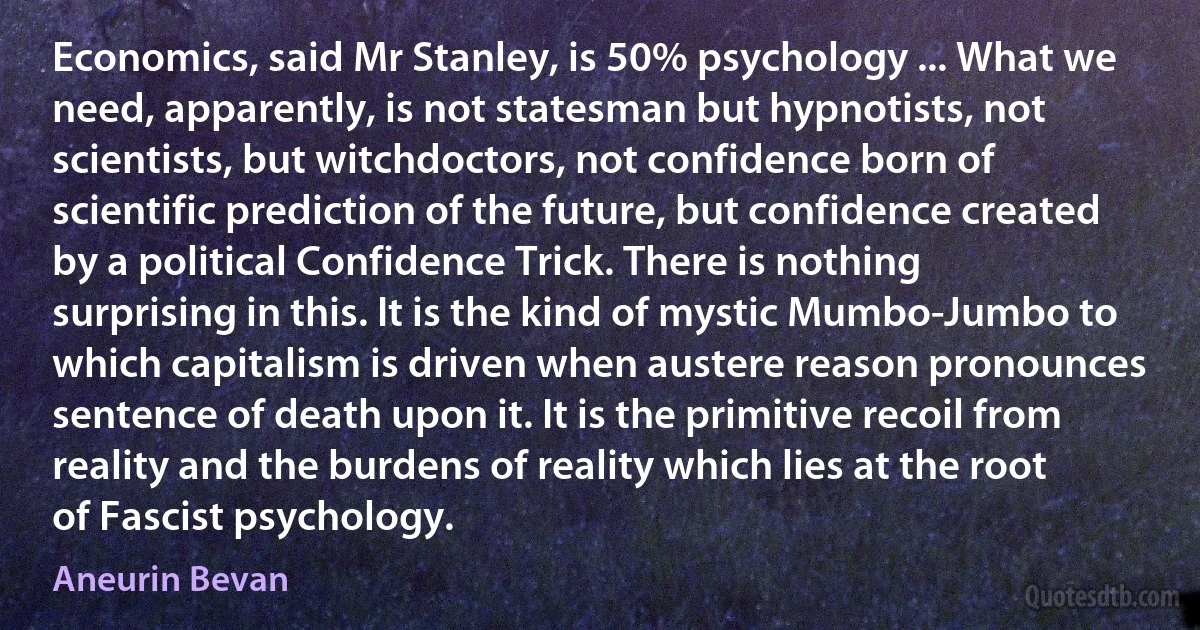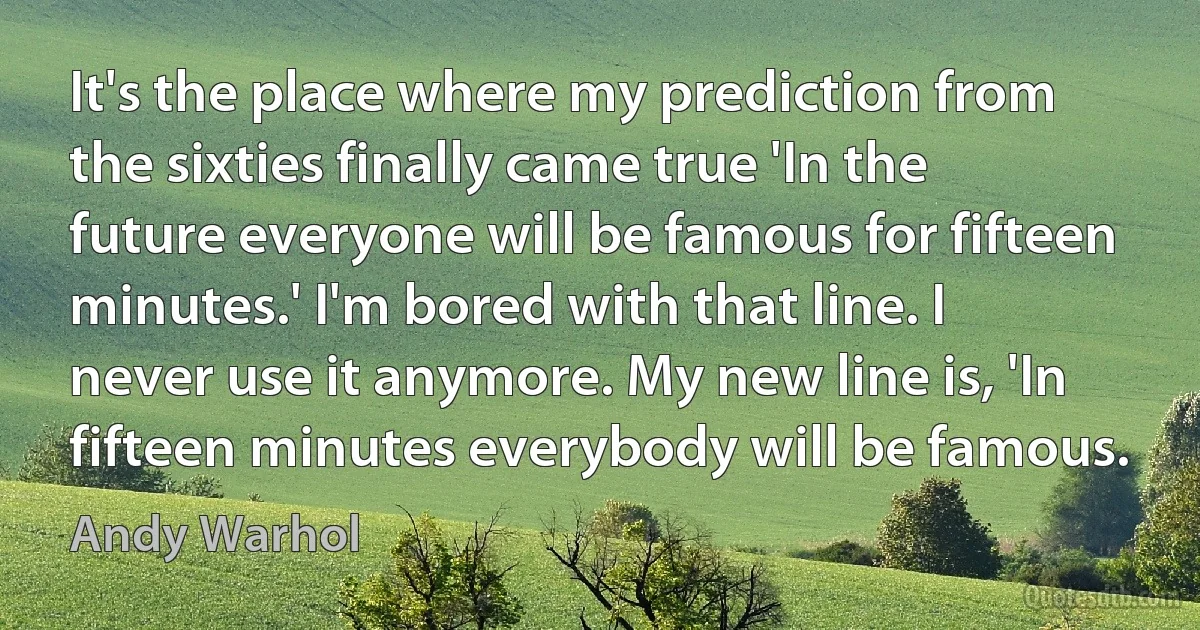Prediction Quotes - page 2
We don't have much time left. We are moving towards temperature increases of around two degrees Celsius, which is going to have consequences in the tropics, and we will loose things like glaciers. That's not a theory; it's happening right now. It's not a prediction; it's happening right now. But you just sightsee near those glaciers. But the glaciers are a big source of water. And on the questions of water, in California we store our water in a snowpack. When that's gone, the rain will be the same but it won't accumulate. With warming temperatures the snowpack will now work. It might be possible to substitute with dams, but that's complicated. This is conjoined with a big energy problem and I think that we really have to encourage development in this area. Just waiting for technological improvement won't work. We need to encourage it.

Kenneth Arrow
At Chicago, I was in the midst of a veritable galaxy of stars: Trygve Haavelmo, Tjalling Koopmans, Theodore Anderson, Leonid Hurwicz, Herman Rubin, Kenneth Arrow, Don Patinkin, Herman Chernoff, and Herbert Simon, among others. I completed my first of a series of macroeconometric models, solidified my understanding of econometrics, learned (through endless discussion) about the functioning of the economy, and got started on several theoretical paths such as aggregation, demand systems, and prediction.

Lawrence Klein
In the outside world, all forms of intelligence, whether of sound or sight, have been reduced to the form of varying currents in an electric circuit in order that they may be transmitted. Inside the human frame exactly the same sort of process occurs. Must we always transform to mechanical movements in order to proceed from one electrical phenomenon to another? It is a suggestive thought, but it hardly warrants prediction without losing touch with reality and immediateness.

Vannevar Bush
No technique is possible when men are free. ... Technique requires predictability and, no less, exactness of prediction. It is necessary, then, that technique prevail over the human being. ... The individual must be fashioned by techniques ... in order to wipe out the blots his personal determination introduces into the perfect design of the organization.

Jacques Ellul
Inflation takes advantage of this possibility... to let gravity be the repulsive force that drove the universe into the period of expansion that we call the Big Bang. In fact, when one combines general relativity with conventional ideas, now, in particle physics there really is a pretty clear indication, I should say, not quite a prediction... that at very high energy densities one expects to find states of matter which literally turn gravity on its head and cause gravity to become repulsive.

Alan Guth
If any person had told the Parliament which met in terror and perplexity after the crash of 1720 that in 1830 the wealth of England would surpass all their wildest dreams, that the annual revenue would equal the principal of that debt which they considered an intolerable burden, that for one man of £10,000 then living there would be five men of £50,000, that London would be twice as large and twice as populous, and that nevertheless the rate of mortality would have diminished to one half of what it then was, that the post-office would bring more into the exchequer than the excise and customs had brought in together under Charles II, that stage coaches would run from London to York in 24 hours, that men would be in the habit of sailing without wind, and would be beginning to ride without horses, our ancestors would have given as much credit to the prediction as they gave to Gulliver's Travels.

Thomas Babington Macaulay
I wish it was in my power to confirm General Sullivan's prediction of the 17th, but I cannot flatter my self with such an agreeable issue. I am sensible he is in common very sanguine, but his expectations were not ill-founded in the present case. We had every reason to hope for success, from our numbers, and from the enemy's fears. Indeed, General Pigot was heard to say, the garrison must fall, unless they were speedily relieved by a British fleet. *If we could have made a landing upon the south part of the town, two days would have put us in complete possession of it. Nothing was wanting to effect this, but the cooperation of the fleet and French forces. The disappointment is vexatious and truly mortifying. The garrison was so important, and the reduction so certain, that I cannot with patience think of the event. The French ship that was missing has got into Boston. The rest of the fleet have not got there yet, or at least we have no accounts of their arrival.

Nathanael Greene
Prediction of the future is possible only in systems that have stable parameters like celestial mechanics. The only reason why prediction is so successful in celestial mechanics is that the evolution of the solar system has ground to a halt in what is essentially a dynamic equilibrium with stable parameters. Evolutionary systems, however, by their very nature have unstable parameters. They are disequilibrium systems and in such systems our power of prediction, though not zero, is very limited because of the unpredictability of the parameters themselves. If, of course, it were possible to predict the change in the parameters, then there would be other parameters which were unchanged, but the search for ultimately stable parameters in evolutionary systems is futile, for they probably do not exist... Social systems have Heisenberg principles all over the place, for we cannot predict the future without changing it.

Kenneth Boulding
To say that prediction is the purpose of a scientific theory is to confuse means with ends. It is like saying that the purpose of a spaceship is to burn fuel. ... Passing experimental tests is only one of many things a theory has to do to achieve the real purpose of science, which is to explain the world.

David Deutsch
Predictions of the future are never anything but projections of present automatic processes and procedures, that is, of occurrences that are likely to come to pass if men do not act and if nothing unexpected happens; every action, for better or worse, and every accident necessarily destroys the whole pattern in whose frame the prediction moves and where it finds its evidence.

Hannah Arendt
Psychiatry is institutionalized scientism: it is the systematic imitation, impersonation, counterfeiting, and deception. This is the formula: every adult smokes (drinks, engages in sexual activity, etc.); hence, to prove that he is an adult, the adolescent smokes (drinks, engages in sexual activity, etc). Mutatis mutandis: every science consists of classification, control, and prediction; hence to prove psychiatry is a science, the psychiatrist classifies, controls, predicts. The result is that he classifies people as mad; that he confines them as dangerous (to themselves or others); and that he predicts people's behavior, robbing them of their free will and hence of their very humanity.

Thomas Szasz



